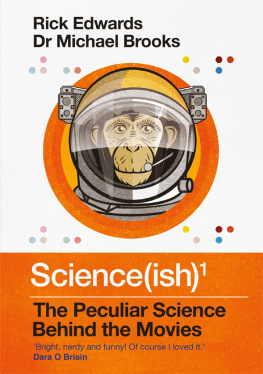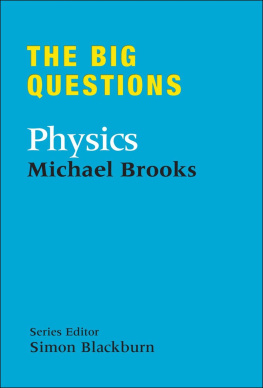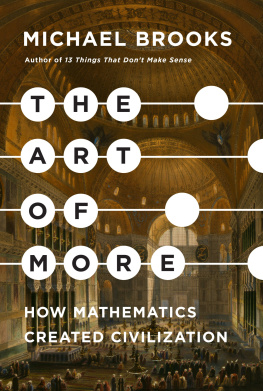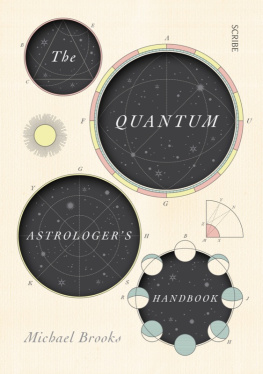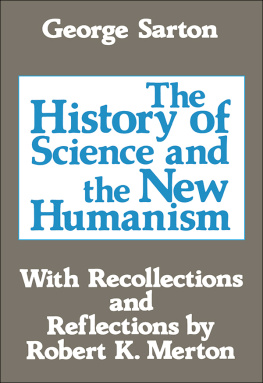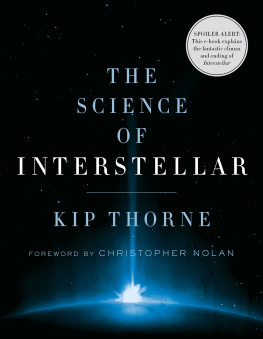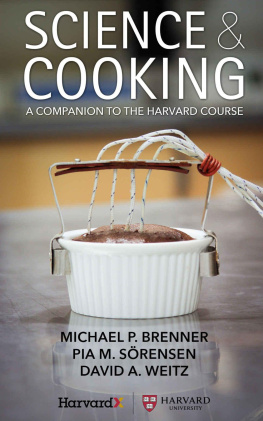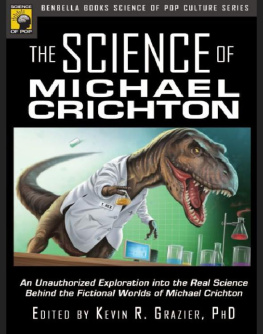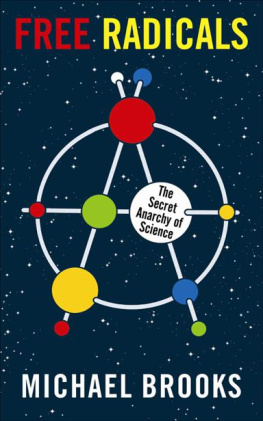Michael Brooks - Science(ish) : the peculiar science behind the movies
Here you can read online Michael Brooks - Science(ish) : the peculiar science behind the movies full text of the book (entire story) in english for free. Download pdf and epub, get meaning, cover and reviews about this ebook. year: 2017, genre: Art. Description of the work, (preface) as well as reviews are available. Best literature library LitArk.com created for fans of good reading and offers a wide selection of genres:
Romance novel
Science fiction
Adventure
Detective
Science
History
Home and family
Prose
Art
Politics
Computer
Non-fiction
Religion
Business
Children
Humor
Choose a favorite category and find really read worthwhile books. Enjoy immersion in the world of imagination, feel the emotions of the characters or learn something new for yourself, make an fascinating discovery.
- Book:Science(ish) : the peculiar science behind the movies
- Author:
- Genre:
- Year:2017
- Rating:4 / 5
- Favourites:Add to favourites
- Your mark:
- 80
- 1
- 2
- 3
- 4
- 5
Science(ish) : the peculiar science behind the movies: summary, description and annotation
We offer to read an annotation, description, summary or preface (depends on what the author of the book "Science(ish) : the peculiar science behind the movies" wrote himself). If you haven't found the necessary information about the book — write in the comments, we will try to find it.
Science(ish) : the peculiar science behind the movies — read online for free the complete book (whole text) full work
Below is the text of the book, divided by pages. System saving the place of the last page read, allows you to conveniently read the book "Science(ish) : the peculiar science behind the movies" online for free, without having to search again every time where you left off. Put a bookmark, and you can go to the page where you finished reading at any time.
Font size:
Interval:
Bookmark:

Science(ish)
| Rick Edwards is a writer and television presenter. His debut book,None of the Above, which explained the political landscape in the UK, reached number 5 in the overall Amazon UK chart. Rick has a Natural Sciences degree from Cambridge but only dimly recalls it. |
| Dr Michael Brooks is an author, journalist, and consultant for the New Scientist. His biggest accomplishment to date is not the PhD in Quantum Physics its writing Ricks favourite popular science book, 13 Things That Dont Make Sense. |
Behind the Movies
Rick Edwards
Dr Michael Brooks

First published in hardback in Great Britain in 2017 by
Atlantic Books, an imprint of Atlantic Books Ltd.
Copyright Rick Edwards and Michael Brooks, 2017
Internal illustrations www.sophierichardson.co.uk
Chapter header illustrations www.patrickknowlesdesign.co.uk
The moral right of Rick Edwards and Michael Brooks to be identified as the authors of this work has been asserted by them in accordance with the Copyright, Designs and Patents Act of 1988.
All rights reserved. No part of this publication may be reproduced, stored in a retrieval system, or transmitted in any form or by any means, electronic, mechanical, photocopying, recording, or otherwise, without the prior permission of both the copyright owners and the above publisher of this book.
1 2 3 4 5 6 7 8 9
A CIP catalogue record for this book is available from the British Library.
Hardback ISBN: 9781786492210
EBook ISBN: 9781786492227
Printed in Great Britain
Atlantic Books
An Imprint of Atlantic Books Ltd
Ormond House
2627 Boswell Street
London
WC1N 3JZ
www.atlantic-books.co.uk
Y ou can pack a lot of hard-hitting truth into a work of fiction. Remember Aesop? The old Greek jackanory? A couple of thousand years ago his fables got some good reviews. Apollonius of Tyana, for example, said Aesop, by announcing a story which everyone knows not to be true, told the truth.
Aesops greatest hits included The Boy Who Cried Wolf, The Fox and the Grapes and The Lion and the Mouse. They all teach us something, making us think about how we should act. And we dont notice, because were enjoying a diverting story. In other words, Aesop knew how to simultaneously entertain us and make us smarter and better human beings.
The same thing happens when science hits the silver screen. Modern movie-makers are big fans of science. They dont always follow its rules to the letter, but they do see its value to humanity. There is no end of screenplays that show science to be at the core of who we are, what we do, where were going and what the consequences might be good and bad. They might be informed speculations, but they are often very well informed.
Whats more, they invite us to ask some profound questions. Do we need an agency that takes responsibility for diverting asteroids? Is it possible that we could have a global disease pandemic? Can we analyse peoples thought patterns, or their shared online data, to predict and prevent crime? Should mogwai be kept as pets?
You might recognize these as movie plots. But its important to realize that Hollywood doesnt just make this stuff up. These stories are all based around ideas that real scientists are working on.
The American screenwriter William Goldman famously said that, in Hollywood, nobody knows anything. But Goldman was wrong. Many of Hollywoods directors, producers and writers pay close attention to science. These are clever, creative people, who see what is going on in the scientific sphere and bring it into the light. And so looking at the peculiar science behind the movies is actually a great way to start an important conversation.
In this book youll be faced with as-yet-unanswerable conundrums about genetic manipulation, the merits of colonizing other planets, creating animals that are part human, the hopes and fears surrounding artificial intelligence, the ethics of de-extinction Theres plenty to think about.
Luckily, theres also some knockabout stuff that probably wont affect the future of humanity. Steel yourselves for the paradoxes of time travel, the mind-bending properties of black holes and the thorny issue of whether we are living in a Matrix-style simulation.
We have loved delving into all these questions in our podcast, and now in this book and were hoping youre going to have an equally good time exploring these modern fables. Aesop was OK, but we think Hollywood does it better.
Well, apart from the mogwai.

HOW WILL WE GET TO THE RED PLANET?
IS A MARTIAN HOLIDAY GOOD FOR YOUR HEALTH?
CAN WE REALLY MAKE A LIFE ON MARS?

I love The Martian. Its Man vs Wilderness, botanist Mark Watney vs his cosmic fate, Matt Damon vs Ridley Scott leaving him stranded and helpless. Its crammed with science about how humans might live on the surface, what the dusty red soil is made of, what we might be able to grow

Not sure youd need an actual botanist for that. Growing plants is hardly rocket science, is it?

Oh really? You think a quantum physicist would be better?

Well, plants are quantum mechanical at heart, with the photosynthesis mechanism transferring energy through the leaf in a superposition state

Your weird fetish for quantum is embarrassing. The only reason Id be taking a quantum physicist to Mars is to help the crew sleep through the journey. And as a source of protein.
R idley Scotts film is based on an excellent and crazily well-researched book (youre right, exactly like this one) by Andrew Weir. While astronauts are pottering around on the Martian surface in 2035, a storm hits. Poor old Matt gets whacked by a broken antenna that pierces his spacesuit and damages the instruments that broadcast his biostats. His friends think hes a goner, so they leave him for dead, blasting off from Mars towards Earth before the storm blows their spaceship over. But this is a Matt Damon movie. So surprise! Matt regains consciousness, finds himself alone and with very limited food, and quickly realizes that hes going to have to science the shit out of this situation
Its a big ask. When youre watching the film, you get the sense that Mars has no mercy. Its dust storms are apocalyptic. Nothing will grow there. Theres precious little water and barely any atmosphere, its generally nippy by day and needle-sharp cold by night, getting down to minus 125 Celsius in places. Even its reputation is aggro: the colour of the planet Mars, fourth rock from the Sun, reminded the Romans of blood, so they named it after their god of war.
Font size:
Interval:
Bookmark:
Similar books «Science(ish) : the peculiar science behind the movies»
Look at similar books to Science(ish) : the peculiar science behind the movies. We have selected literature similar in name and meaning in the hope of providing readers with more options to find new, interesting, not yet read works.
Discussion, reviews of the book Science(ish) : the peculiar science behind the movies and just readers' own opinions. Leave your comments, write what you think about the work, its meaning or the main characters. Specify what exactly you liked and what you didn't like, and why you think so.

